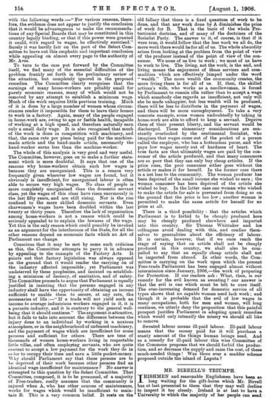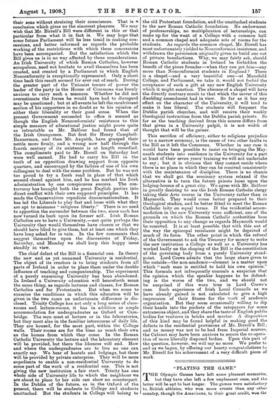MR. BIRRELL'S TRIUMPH.
IRISHMEN and reasonable Englishmen have been so long waiting for the gift-horse which Mr. Birrell has at last presented to them that they may well decline to inspect it too closely. Ireland is at last to have a University to which the majority of her people can send their sons without straining their consciences. That is a conclusion which gives us the sincerest pleasure. We may wish that Mr. Birrell's Bill were different in this or that particular from what it in fact is. We may hope that some future Parliament will be less timid in making con- cessions, and better informed as regards the probable working of the restrictions with which these concessions have been accompanied. But the satisfaction which the Bill gives us is in no way affected by these considerations. An Irish University of which Roman Catholics, however scrupulous, need not hesitate to avail themselves has been created, and created by a Parliament in which English Nonconformity is exceptionally represented. Only a short time back this result seemed for ever out of reach. During the greater part of the Unionist tenure of power the leader of the party in the House of Commons was keenly anxious to carry such a measure. Whether he did not overestimate the forces he would have had to disregard may be questioned ; but at all events he left the recalcitrant section of his supporters in no doubt as to his opinion of either their liberality or their good sense. When the present Government succeeded to office it seemed as though the English Nonconformists' resistance to this simple measure of educational justice might prove quite as intractable as Mr. Balfour had found that of the Irish Orangemen. But first Sir Henry Campbell- Bannerman, and then Mr. Asquith, have grasped their nettle more firmly, and a wrong now half through the fourth century of its existence is at length remedied. The compliments paid to Mr. Birrell on Saturday last were well earned. Ho had to carry his Bill in the teeth of an opposition drawing support from opposite quarters, and encouraged by the failure of one of his own colleagues to deal with the same problem. But he was not too proud to try a fresh road in place of that which seemed closed against him, and he has marked his Irish administration by one conspicuous success. The con- troversy has brought both the great English parties into direct conflict with their own supposed principles. It has made the Conservatives repudiate denominationalism. It has led the Liberals to play fast and loose with what they are apt to misname " religious liberty." There is no need to apportion the surrender between the two, since each has now turned its back upon its former self. Irish Roman Catholics are to have a University,—not quite perhaps the University they would themselves have chosen or that we should have liked to give them, but at least one which they have long asked for in vain. In the few comments that suggest °themselves upon the discussions of Friday, Saturday, and Monday we shall keep this happy issue steadily in view.
The chief defect of the Bill is a financial one. In theory the new and as yet unnamed University is residential. The object of its creators is to bring students from all parts of Ireland in order to place them under the double influence of teaching and companionship. The experiment of a purely examining University has been abandoned. In Ireland a University education will henceforth mean the same thing, as regards lectures and classes, for Roman Catholics and for Protestants. But when we come to examine the conditions in which this education will be given in the two cases an unfortunate difference is dis- closed. Trinity College has not only a long series of class- rooms and lecture-rooms, it has in addition as ample accommodation for undergraduates as Oxford or Cam- bridge. The men meet at lecture or in the laboratories, but they meet also in the familiar intercourse of daily life. They are housed, for the most part, within the College walls. Their rooms are for the time as much their own as the homes from which they come. In the Roman Catholic University the lecture and the laboratory element will be provided, but there the likeness will end. How and where the undergraduates are to live no one can exactly say. We hear of hostels and lodgings, but these will be provided by private enterprise. They will be mere expedients to enable a non-residential University to do some part of the work of a residential one. This is not giving the new institution a fair start. Trinity has one whole side of University life to which the neighbour we are about to place by her side can show no counterpart. In the Dublin of the future, as in the Oxford of the present, there will be students in College and students unattached. But the students in College will belong to the old Protestant foundation, and the unattached students to the new Roman Catholic foundation. No endowment of professorships, no multiplication of lectureships, can make up for the want of a College with a common hall and a common chapel and adequate sets of rooms for the students. As regards the common chapel, Mr. Birrell has most unfortunately yielded to Nonconformist insistence, and withdrawn the permission originally given to build one out of private benefactions. Why, we may fairly ask, should Roman Catholic students in Ireland be forbidden the benefit of the pious founder—when they can get him—any more than Nonconformist students in England ? There is a chapel—and a very beautiful one—at Mansfield College, and Parliament, we take it, would not forbid the acceptance of such a gift at any new English University which it might sanction. The absence of a chapel will have the directly contrary result to that which the mover of this disabling amendment had in view. So far as it has any effect on the character of the University, it will tend to make it less liberal. The students will frequent the Dublin parish churches, and will receive their weekly theological instruction from the Dublin parish priests. So far as the teaching derived from this source differs from that given in a University pulpit, it is not width of thought that will be the gainer.
This sacrifice of efficiency, either to religious prejudice or to a narrow economy, is the cause of two other faults in the Bill as it left the Commons. Whether in any case it would have been possible to insist on bringing the May- nooth students into residence in the University for a part at least of their seven years' training we will not undertake to say ; but it is obvious that they cannot reside where there is no place in which they can be received consistently with the maintenance of discipline. There is no chance that we shall get the seminary system relaxed if the alternative is to turn the future priests loose upon the lodging-houses of a great city. We agree with Mr. Balfour in greatly desiring to see the Irish Roman Catholic clergy taking their Arts course in the University rather than iu Maynooth. They would come better prepared to their theological studies, and be better fitted to meet the Roman Catholic laity on equal terms. If the residential accom- modation in the new University were sufficient, one of the grounds on which the Roman Catholic authorities base their opposition to any change as regards Maynooth would be removed. It is at least possible that with this out of the way the episcopal resistance might be deprived of much of its force. The other point in which the refusal of the Government to ask the Treasury for money to make the new institution a College as well as a University has worked badly on the shaping of the Bill is the constitution of the governing body from a purely University stand- point. Lord Crewe admits that the large share given to the outside—the non-academic—element is a matter upon which " each man is entitled to hold his own opinion." This formula not infrequently conceals a suspicion that the opinion which the speaker happens to be defend- ing is the worse of the two, and we should not be surprised if this were true in Lord Crewe's case. Such experience of Irish Local Councils as we have already gained is not calculated to give a. high impression of their fitness for the work of academic organisation. But they seem occasionally willing to dip their hands into the pockets of the ratepayers for some extraneous object, and they share the taste of English public bodies for ventures in bricks and mortar. A disposition of this kind may be found helpful in making good the defects in the residential provisions of Mr. Birrell's Bill ; and as money was not to be had from Imperial sources, the Cabinet may have been anxious to secure the co-opera- tion of more liberally disposed bodies. Upon this part of the question, however, we will say no more. We prefer to end as we began, by offering our hearty congratulations to Mr. Birrell for his achievement of a very difficult piece of work.



































 Previous page
Previous page